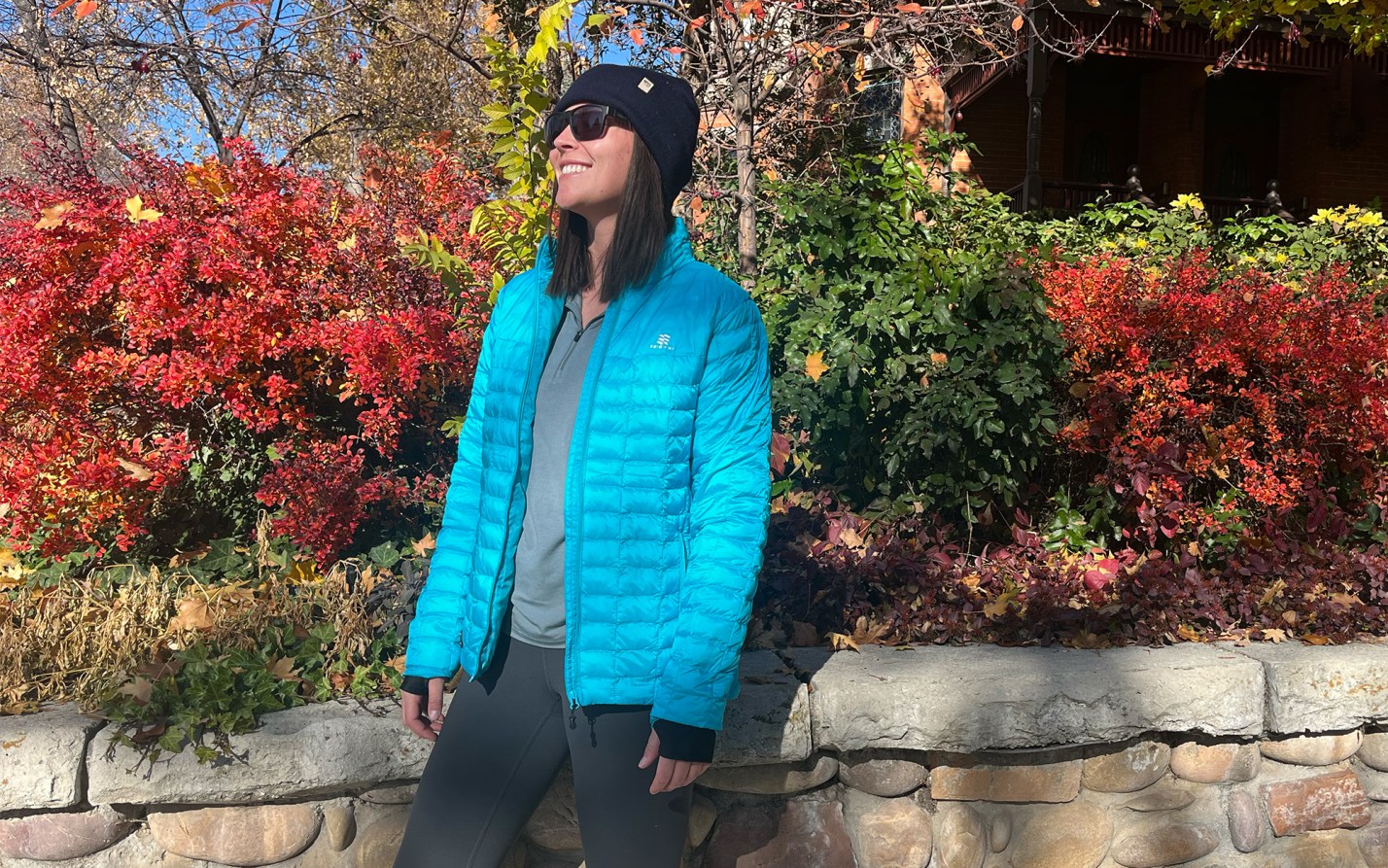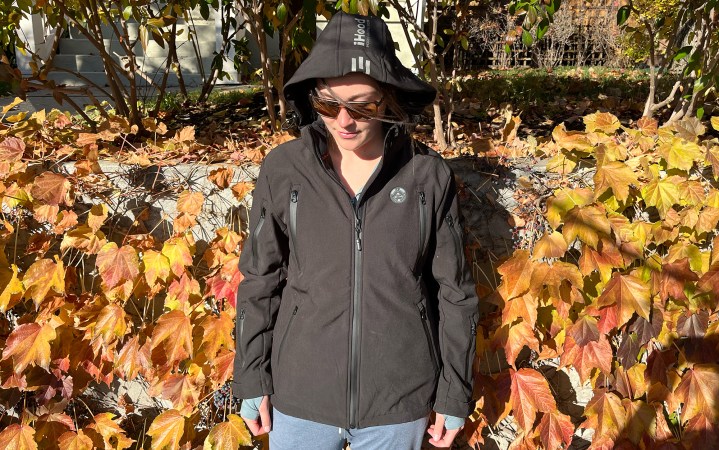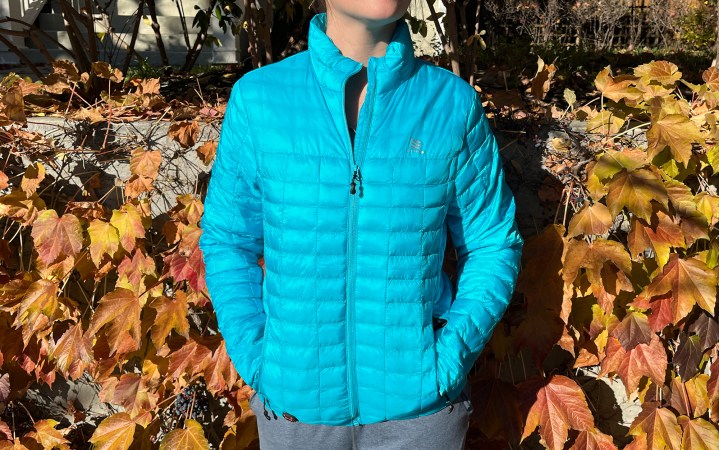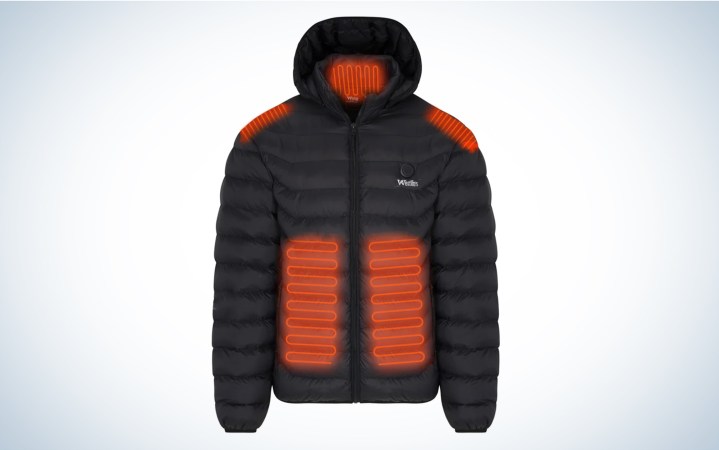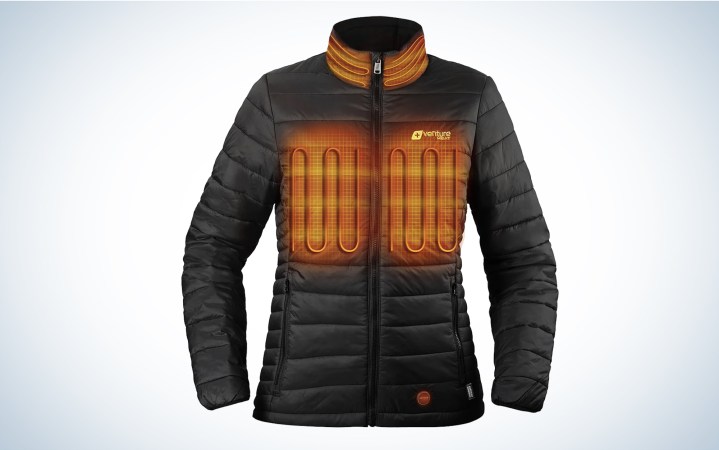We may earn revenue from the products available on this page and participate in affiliate programs. Learn More ›
Heated apparel is quickly becoming more common, with socks, gloves, and vests amongst the most popular. But do you really need an entire heated jacket? If you like being warm, hate being cold, and don’t mind keeping one more device charged, then yes. I took a look at some of the top models to find the best heated jackets to keep you warm this winter.
- Best Overall: iHood Heated Jacket
- FieldSheer Backcountry Heated Jacket
Other Heated Jackets to Consider
How I Tested the Best Heated Jackets
I received three heated jackets for testing including the FieldSheer Backcountry and iHood. The third was removed from testing because it read the extremely low temperature of 76 degrees Fahrenheit and would not turn on again after the first round of testing. Then, I used the results of my test of the best heated vests to infer how the Weston and Venture heated jackets would perform. For testing I turned all of the jackets (and vests) on high and checked on them hourly to determine battery life. Once they were warmed up I took their temperature by lifting up the bottoms and placing a digital probe thermometer on the nearest heating element. This gives me a ballpark idea of how hot the jackets actually get, but isn’t exact by any means. Then, I wore them around Salt Lake City, Utah, in November to get an idea of how well they actually keep the chill out.
Best Heated Jackets: Reviews & Recommendations
Best Overall: iHood Heated Jacket
Key Features
- Heat Settings: Four
- Battery Life: 2.5 hours on high
- Heat Zones: Front, back, lumbar, and collar
- Price: $189.99
Pros
- Can control heat zones as well as settings
- Removable hood
- Collar heating
- Weather resistant
- Machine washable
Cons
- Only used as outer layer
The iHood heated jacket is a sturdy soft shell jacket with heating panels in the front, back, lumbar, and collar. You can control the heating zones along with their heat levels. You can also control if the control button on the chest lights up or not. There are four buttons, one for each zone: hood, back, and front. And a button to turn the light on and off. This is a great way to save battery should you only need some heat. And you might need to save battery because this jacket only lasts about two and a half hours with all heat zones on the highest setting. Though, I can’t imagine anyone needing to use the highest setting in this very warm coat.
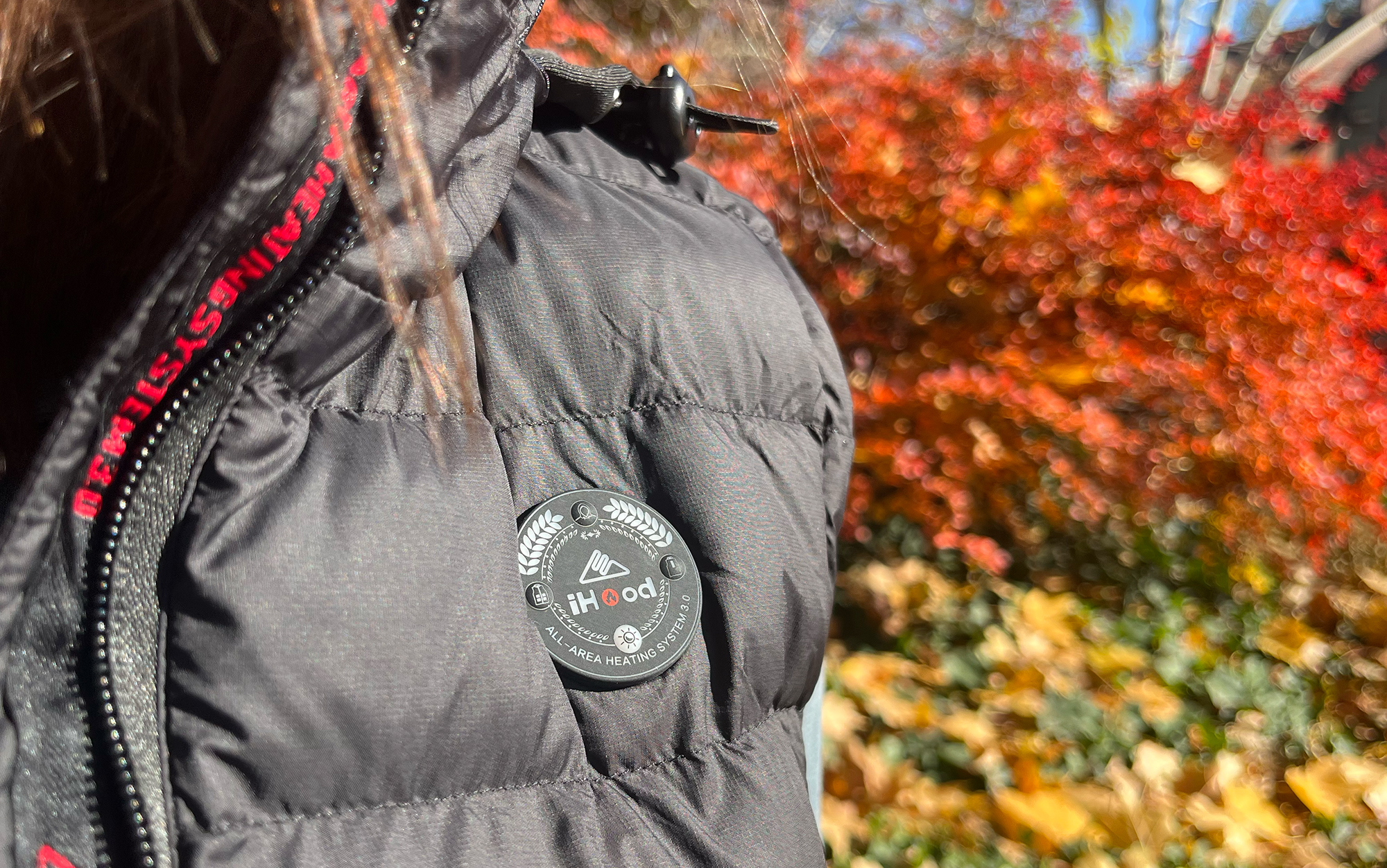
The hood is removable and made of the same weather resistant material as the jacket. The six heating panels in this jacket make it super warm and I love the collar and lumbar zones. I measured this jacket at an impressive 148.3 degrees Fahrenheit. If you’re looking for a super warm and weather resistant coat for sitting outside e.g. watching sports, waiting for the dog to go, fishing, or commuting to work, this is it. I wouldn’t say this coat is dead silent (and certainly not camo), but it’s quiet enough to hunt in, too. If you don’t mind a soft shell with no snow skirt, you could ski in it. There are nine pockets on this jacket and a retractable flap on the bottom to protect from rain.
FieldSheer Backcountry Heated Jacket
Key Features
- Heat Settings: Four
- Battery Life: 2 hours on high
- Heat Zones: Chest and back
- Price: $209.99
Pros
- Water resistant
- Useful for layering
- Thumb holes
- Bluetooth compatible
- Small battery
- Machine washable
Cons
- Only lasts 2 hours on high
- No collar heating
Fieldsheer’s Backcountry jacket is a great fall puffer on its own. But it also features two heating panels on the chest and one on the back. The temperature measured 137.5 degrees Fahrenheit. The battery is the smallest I looked at between heated vests and jackets, looking closer in size to one of the best heated socks’ batteries. But this convenient size also means the jacket dies in about two hours on the highest setting.
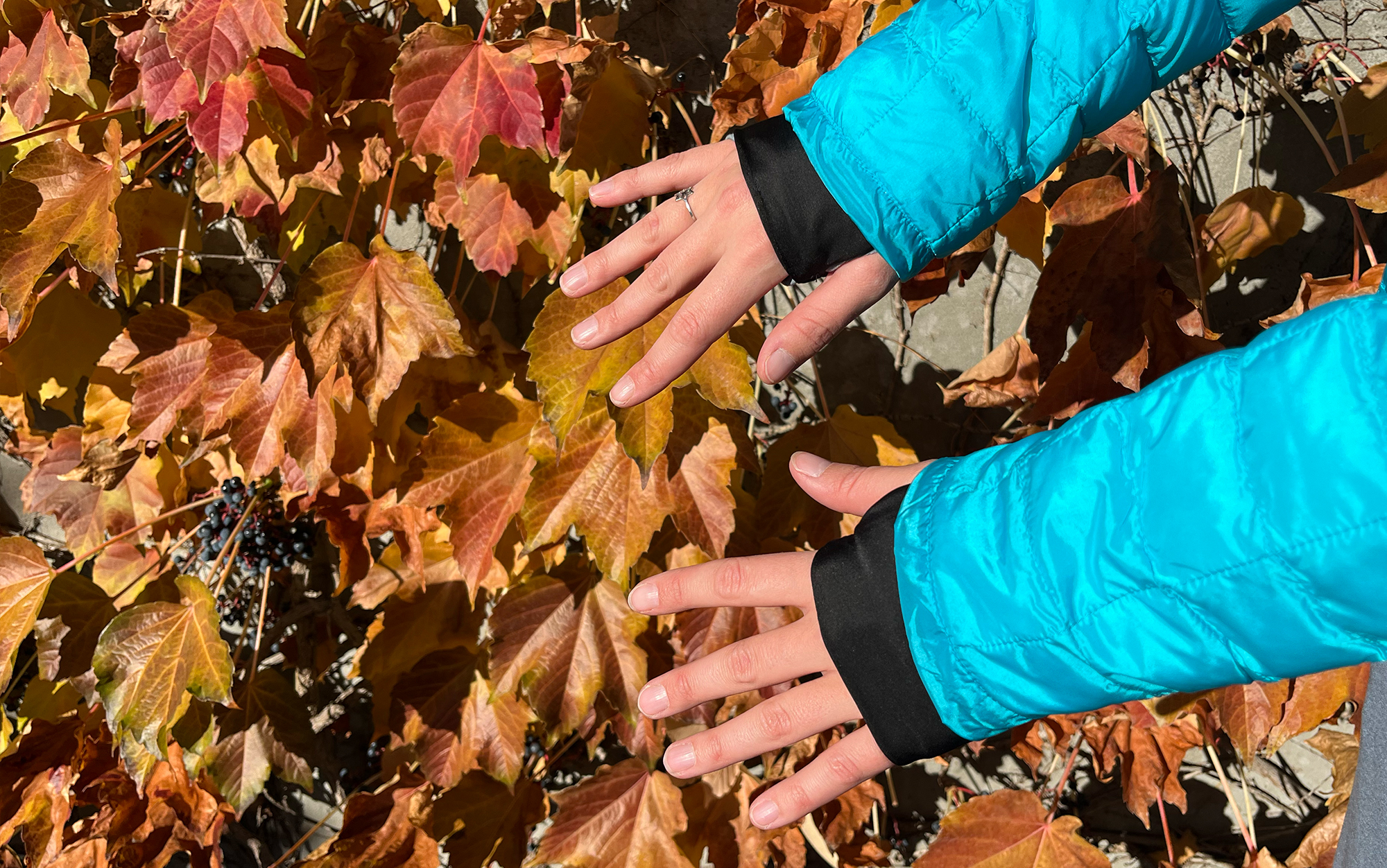
This jacket is Bluetooth compatible which is great if you plan to layer this puffy under a hardshell. But there’s also a physical button on the hem that allows you to toggle through the four heat settings if you’re wearing gloves or don’t want to dig your phone out. Overall, this jacket is easy to care for and versatile. You can layer it or it’s weather resistant and can be worn as an outer layer.
Other Heated Jackets to Consider
Weston Upgraded Heated Jacket
Key Features
- Heat Settings: Three
- Battery Life: 3 hours on high
- Heat Zones: Back, front, neck, and shoulders
- Price: $300
While I wasn’t able to test the Weston heated jacket, I did test the upgraded heated puffer vest, which read 126.5 degrees Fahrenheit and lasted three hours on the highest setting. It’s machine washable for easy maintenance. And I think the collar heating element really warms you up. I love that the jacket also features shoulder heating. The large back panel also looks toasty. If you’re looking for a puffy that lasts a little longer than the Fieldsheer with more heating zones, check out the Weston with the upgraded battery.
Venture Heated Puffer Jacket with HeatSync
Key Features
- Heat Settings: Three to 10
- Battery Life: 3 hours on high
- Heat Zones: Chest, back, and collar
- Price: $199
I loved the Venture heated vest because of its Bluetooth capability and collar heating. The heated puffer jacket looks to be the exact same. Venture’s Heated Puffer Vest lived up to its advertised battery life and it read a respectable 128.7 degrees Fahrenheit. At only $10 more for the jacket, it seems you’re just getting added puffer sleeves. Opt for the jacket if you’d never wear a vest or wish to trap in more heat.
Things to Consider Before Buying the Best Heated Jacket
Warmth
Obviously, if you’re buying a heated jacket, you are concerned with warmth. I took the temperature of these jackets (and vests) to get a ballpark idea of how hot they actually get. But, this does not exactly translate into how warm you’ll be. First, I’d like to caution against relying solely on a heated jacket for warmth in the backcountry. Any battery powered device is subject to fail. Maybe you spill your water bottle on the battery pack; maybe it dies. Maybe a squirrel chews through the wire. You never know what can happen and a heated vest is not an excuse to improperly layer. If you’re wearing a heated jacket into the backcountry, layer it as a normal vest without a heating element.
Read Next: How to Layer for Hiking
Second, how warm one of the best heated jackets will get doesn’t solely depend on how hot it is. The size, and even the location, of the panels matters too. A collar heating element warms me up the fastest. My advice is to pay closer attention to where the heating panels are located than you think you should.
Controls
After a few ski runs, you start to warm up. Some people de-layer, some people let the chill set back in on the lift, and some lucky few turn down their heated jacket. However, if that jacket is buried under a hardshell (don’t put it on under your bibs or waders), panic ensues. Overheating means you start to sweat which will make you colder. So try to be strategic about where your vest’s controls are located, or pick one with Bluetooth. The Fieldsheer and Venture both allow you to turn down or turn off your jacket via an app on your phone.
Battery Life
Some heated jackets can use a different power bank to function and most companies sell their batteries separately so you could bring an extra and switch them out in the field for longer run times. Take into account the battery life so you’re not left freezing. Also keep in mind that you should detach the battery from the cord when you’re not using it, otherwise it will slowly suck power.
FAQs
A heated vest is better than a heated jacket for layering. You have more options on what to put under and over the vest to stay warm without overheating. However, a jacket you’re likely only able to wear on its own or under a rain or snow shell.
The heated jackets I tested lasted two to two and a half hours on the highest setting. Though, because the jackets are warm on their own, you probably won’t have to use the highest setting all the time.
The iHood is a softshell that should withstand a little rain. I would only wear the puffer options on their own in a light sprinkle. Be sure your battery stays dry and definitely don’t let rain soak you through, due to the safety concerns of wearing electricity powered clothing.
Final Thoughts on the Best Heated Jackets
The best heated jackets are a great way to get outdoors in the winter time. If you’re dreading outdoor activities or commutes as temperatures drop, consider one of these battery-powered outer layers to get you through the longest nights of the year.
- Best Overall: iHood Heated Jacket
- FieldSheer Backcountry Heated Jacket
Other Heated Jackets to Consider
